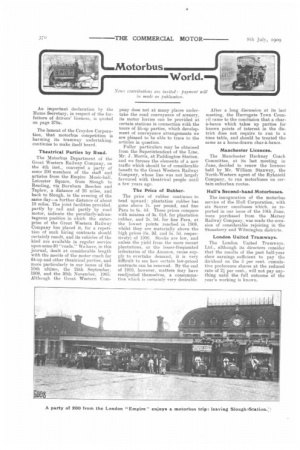Motorbus World.
Page 8

If you've noticed an error in this article please click here to report it so we can fix it.
News cOntributions are invited : payment will be made on publication.
An important declaration by the Home Secretary, in respect of the forfeiture of drivers' licences, is quoted on page 370a.
The lament of the Croydon Corporation, that motorbus competition is harming its tramway undertaking. continues to make itself heard.
Theatrical Parties by Road.
The Motorbus Department of the Great Western Railway Company, on the 4th inst., conveyed a party of some 200 members of the staff and artistes from the Empire Music-hall, Leicester Square, from Slough to Reading, via Burnham Beeches and Taplow, a distance of 26 miles, and back to Slough, in the evening of the same day—a further distance of about 18 miles. The joint facilities provided. partly by rail and partly by road motor, indicate the peculiarly-advantageous position in which the enterprise of the Great Western Railway Company has placed it, for a repetition of such hiring contracts should certainly result, and its vehicles of the kind are available in regular service upon some 30 "roads," We have, in this journal, dealt at considerable length with the merits of the motor coach for fit-up and other theatrical parties, and more particularly in our issues of the 10th ultimo, the 24th September, 1908, and the 30th November, 1905. Although the Great. Western Corn
pany does not at many places undertake the road conveyance of scenery, its motor lorries can be provided at certain stations in connection with the tours of fit-up parties, which development of conveyance arrangements we are pleased to be able to trace to the articles in question.
Fuller particulars may be obtained from the Superintendent of the Line, Mr. J. Morris, at Paddington Station, and we foresee the elements of a new traffic which should be of considerable benefit to the Great Western Railway Company, whose line was not largely favoured with theatrical people until a few years ago.
The Price of Rubber.
The price of rubber continues to tend upward : plantation rubber has gone above 7s. per pound, and fine Para, to as. 4d. These prices compare with minima of 3s. 00. for plantation rubber, and 2s. 9d. for fine Para, at the lowest points reached in 1908, whilst they are materially above the high prices (6s. 3d. and 5s. 5d. respectively) of 1906. Stocks are low, and unless the yield from the more recent plantations, or the lesser-frequented tributaries of the Amazon, cause supply to overtake demand, it is very difficult to see how certain low-priced contracts can be renewed. By the end of 1910, however, matters may have readjusted themselves, a consummation which is certainly very desirable.
After a long discussion at its last meeting, the Harrogate Town Council came to the conclusion that a charir-bancs which takes up parties for known points of interest in the district does not require to run to a time table, and should be treated the same as a horse-drawn char-k-bancs.
Manchester Licences.
The Manchester Hackney Coach Committee, at its last meeting in June, decided to renew the licences held by Mr. William Stanway, the North-Western agent of the Ryknield Company, to run motorbuses on certain suburban routes.
Hull's Second-hand Motorbuses.
The inauguration of the motorbus service of the Hull Corporation, with six Saurer omnibuses which, as reported in our issue of the 10th June, were purchased from the Mersey Railway Company, was made the occasion of considerable rejoicing in the Stoneferry and Wilmington districts.
London United Tramways.
The London United Tramways, Ltd., although its directors consider that the results of the put half-year show earnings sufficient to pay the dividend on the 5 per cent, cumulative preference shares at the reduced rate of 2,1 per cent., will not pay anything until the full outcome of the year's working is known.






















